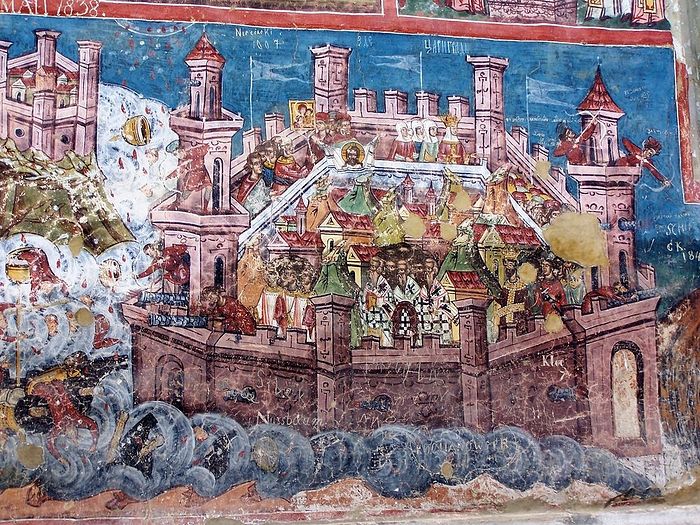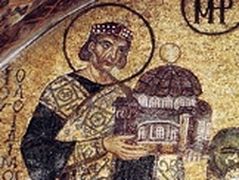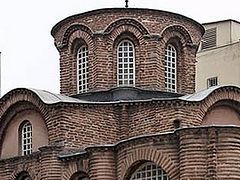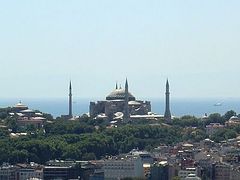Today we remember the tragic, final fall of Constantinople to the Turks with this account by historian Sir Steven Runciman.
The afternoon of Monday, 28 May, had been clear and bright. As the sun began to sink towards the western horizon it shone straight into the faces of the defenders on the walls, almost blinding them. It was then that the Turkish camp had sprung into activity. Men came forward in thousands to complete the filling of the foss, while others brought up cannons and war-machines. The sky clouded over soon after sunset, and there was a heavy shower of rain; but the work went on uninterrupted, and the Christians could do nothing to hinder it. At about half-past one in the morning the Sultan judged that everything was ready and gave the order for the assault.
The sudden noise was horrifying. All along the line of the walls the Turks rushed in to the attack, screaming their battle-cries, while drums and trumpets and fifes urged them on. The Christian troops had been waiting silently; but when the watchmen on the towers gave the alarm the churches near the walls began to ring their bells, and church after church throughout the city took up the warning sound till every belfry was clanging. Three miles away, in the Church of the Holy Wisdom the worshippers knew that the battle had begun. Every man of fighting age returned to his post; and women, nuns amongst them, hurried to the walls to help bring up stones and beams to strengthen the defenses and pails of water to refresh the defenders. Old folk and children came out of their houses and crowded into the churches, trusting that the saints and angels would protect them. Some went to their parish church, others to the tall Church of Saint Theodosia, by the Golden Horn. It was her feast-day on the Tuesday; and the building was decked with roses gathered from the gardens and the hedgerows. Surely she would not abandon her worshippers. Others went back to the great cathedral, remembering an old prophesy that said that though the infidel might penetrate through the city right into the holy building, there the Angel of the Lord would appear and drive them back with his bright sword to perdition. All through the dark hours before dawn the congregations waited and prayed.
There was no time for prayer at the walls. The Sultan had made his plans with care. Despite his arrogant words to his army experience had taught him to respect the enemy. On this occasion he would wear them down before risking his best troops in the battle. It was his irregulars, the Bashi-bazouks, whom he first sent forward. There were many thousands of them, adventurers from every country and race, many of them Turks but many more from Christian countries, Slavs, Hungarians, Germans, Italians and even Greeks, all of them ready enough to fight against their fellow-Christians in view of the pay that the Sultan gave them and the booty that he promised. Most of them provided their own arms, which were an odd assortment of scimitars and slings, bows and a few arquebuses; but a large number of scaling-ladders had been distributed amongst them. They were unreliable troops, excellent at their first onrush but easily discouraged if they were not at once successful. Knowing this weakness Mehmet placed behind them a line of military police, armed with thongs and maces, whose orders were to urge them on and to strike and chastise any who showed signs of wavering. Behind the military police were the Sultan’s own Janissaries. If any frightened irregular made his way through the police they were to cut him down with their scimitars.
The Bashi-bazouks’ attack was launched all along the line, but it was only pressed hard in the Lycus valley. Elsewhere the walls were still too strong; and they were attacked chiefly with the purpose of distracting the defenders from going to reinforce their comrades in the vital section. There the fighting was fierce. The Bashi-bazouks were up against soldiers far better armed and far better trained than themselves; and they were further handicapped by their numbers. They were continually in each other’s way. Stones hurled against them could kill or disable many at a time. Though a few attempted to retreat, most of them kept on, fixing their ladders to the walls and the stockade and clambering up, only to be cut down before they reached the top. Giustiniani and his Greeks and Italians were supplied with all the muskets and culverins that could be found in the city. The Emperor came himself to encourage them. After nearly two hours of fighting Mehmet ordered the Bashi-bazouks to retire. They had been checked and repulsed, but they had served their purpose in wearying the enemy.
Some of the Christians hoped that this might be just an isolated night-attack, intended to test their strength; and all of them hoped for a moment of rest. It was not granted to them. They scarcely had time to reform their lines and replace beams and barrels of earth on the stockade before a second attack was launched. Regiments of Anatolian Turks from Ishak’s army, easily recognized by their special uniforms and breastplates, came pouring down the hill from outside the Civil Gate of Saint Romanus into the valley and wheeled round to face the stockade. Once more the bells of the churches near the walls rang out to give the alarm. But the sound was drowned by the booming of Urban’s great cannon and its fellows as they began afresh to pound the walls. Within a few minutes the Anatolians had rushed in to the assault. Unlike the irregulars they were well armed and well disciplined, and all of them devout Moslems eager for the glory of being the first to enter the Christian city. With the wild music of their trumpeters and pipers to encourage them they hurled themselves at the stockade, climbing over each other’s shoulders in their efforts to fix their ladders on to the barrier and hack their way over the top. In the faint light of flares, with clouds continually veiling the moon it was hard to see what was happening. The Anatolians, like the irregulars before them, were at a disadvantage on that narrow front because of their numbers. Their discipline and their tenacity only made their losses the heavier as the defenders flung stones down on them and pushed back their ladders or fought with them hand to hand. About an hour before dawn, when this second attack was beginning to falter, a ball from Urban’s cannon landed fully upon the stockade, bringing it down for many yards of its length. There was a cloud of dust as the rubble and earth were flung into the air; and the black smoke of the gunpowder blinded the defense. A band of three hundred Anatolians rushed forward through the gap that had been made, shouting that the city was theirs. But, with the Emperor at their head, the Christians closed around them, slaughtering the greater part and forcing the others back to the foss. The check discomfited the Anatolians. The attack was called off, and they retired to their lines. With cries of triumph the defense once more set about repairing the stockade.
The Turks had been no more successful on other sectors. Along the southern stretch of the land-walls Ishak was able to keep up enough pressure to prevent the defense from moving men to the Lycus valley, but, with his own best troops gone to fight there, he could not make a serious attack. Along the Marmora Hamza Bey had difficulty in bringing his ships close in shore. The few landing parties that he was able to send were easily repulsed by the monks to whom the defense had been entrusted or by Prince Orhan and his followers. There were feints along the whole line of the Golden Horn but no real attempt at an assault. Around the Blachernae quarter the fighting was fiercer. On the low ground by the harbour the troops that Zaganos had brought across the bridge kept up the constant attack, as did Karadja Pasha’s men higher up the slope. But Minotto and his Venetians were able to hold their section of the walls against Zaganos, and the Bocchiardi brothers against Karadja.
The Sultan was said to be indignant at the failure of his Anatolians. But it is probable that he intended them, like the irregulars before them, to wear out the enemy rather than themselves to enter the city. He had promised a great prize to the first soldier who should successfully break through the stockade; and he wished the privilege to go to some member of his own favourite regiment, his Janissaries. The time had now come for them to enter the battle. He was anxious; for if they failed him it would scarcely be possible to continue the siege. He gave his orders quickly. Before the Christians had time to refresh themselves and do more than a few rough repairs to the stockade, a rain of missiles, arrows, javelins, stones and bullets fell upon them; and behind the rain, the Janissaries advanced at the double, not rushing in wildly as the Bashi-bazouks and the Anatolians had done, but keeping their ranks in perfect order, unbroken by the missiles of the enemy. The martial music that urged them on was so loud that the sound could be heard between the roar of the guns from right across the Bosphorus. Mehmet himself led them as far as the foss and stood there shouting encouragement as they passed him. Wave after wave of these fresh, magnificent and stoutly armoured men rushed up to the stockade, to tear at the barrels of earth that surmounted it, to hack at the beams that supported it, and to place their ladders against it where it could not be brought down, each wave making way without panic for its successor. The Christians were exhausted. They had fought with only a few minutes’ respite for more than four hours; but they fought with desperation, knowing that if they gave way it would be the end. Behind them in the city the church bells were clanging again, and a great murmur of prayer rose to heaven.
The fighting along the stockade was hand-to-hand now. For an hour or so the Janissaries could make no headway. The Christians began to think that the onslaught was weakening a little. But fate was against them. At the corner of the Blachernae wall, just before it joined the double Theodosian wall, there was, half-hidden by a tower, a small sally-port known as the Kerkoporta. It had been closed up many years earlier; but the old men remembered it. Just before the siege began it had been reopened, to allow sorties into the enemy’s flank. During the fighting the Bocchiardis and their men had made effective use of it against Karadja Pasha’s troops. But now someone returning from a sortie forgot to bar the little gate after him. Some Turks noticed the opening and rushed through it into the courtyard behind it and began to climb up a stairway leading to the top of the wall. The Christians who were just outside the gate saw what was happening and crowded back to retake control of it and to prevent other Turks from following. In the confusion some fifty Turks were left inside the wall, where they could have been surrounded and eliminated if at that moment a worse disaster had not occurred.
It was just before sunrise that a shot fired at close range from a culverin struck Giustiniani and pierced his breastplate. Bleeding copiously and obviously in great pain, he begged his men to take him off the battle-field. One of them went to the Emperor who was fighting near by to ask for the key of a little gate that led through the inner wall. Constantine hurried to his side to plead with him not to desert his post. But Giustiniani’s nerve was broken; he insisted on flight. The gate was opened, and his bodyguard carried him into the city, through the streets down to the harbour where they placed him on a Genoese ship. His troops noticed his going. Some of them may have thought that he had retreated to defend the inner wall; but most of them concluded that the battle was lost. Someone shouted out in terror that the Turks had crossed the wall. Before the little gate could be shut again the Genoese streamed headlong through it. The Emperor and his Greeks were left on the field alone.
From across the foss the Sultan noticed the panic. Crying: ‘The city is ours’, he ordered the Janissaries to charge again and beckoned on a company led by a giant called Hasan. Hasan hacked his way over the top of the broken stockade and was deemed to have won the promised prize. Some thirty Janissaries followed him. The Greeks fought back. Hasan himself was forced to his knees by a blow from a stone and slain; and seventeen of his comrades perished with him. But the remainder held their positions on the stockade; and many more Janissaries crowded to join them. The Greeks resisted tenaciously. But the weight of numbers forced them back to the inner wall. In front of it was another ditch which had been deepened in places to provide earth for reinforcing the stockade. Many of the Greeks were forced back into these holes and could not easily clamber out, with the great inner wall rising behind them. The Turks who were now on top of the stockade fired down on them and massacred them. Soon many of the Janissaries reached the inner wall and climbed up it unopposed. Suddenly someone looked up and saw Turkish flags flying from the tower above the Kerkoporta. The cry went up: ‘The city is taken.’
While he was pleading with Giustiniani the Emperor had been told of the Turks’ entry through the Kerkoporta. He rode there at once, but he came too late. Panic had spread to some of the Genoese there. In the confusion it was impossible to close the gate. The Turks came pouring through; and the Bocchiardis’ men were too few now to push them back. Constantine turned his horse and galloped back to the Lycus valley and the breaches in the stockade. With him was the gallant Spaniard who claimed to be his cousin, Don Francisco of Toledo, and his own cousin Theophilus Paleologus and a faithful comrade-at-arms, John Dalmata. Together they tried to rally the Greeks, in vain; the slaughter had been too great. They dismounted and for a few minutes the four of them held the approach to the gate through which Giustiniani had been carried. But the defense was broken now. The gate was jammed with Christian soldiers trying to make their escape, as more and more Janissaries fell on them. Theophilus shouted that he would rather die than live and disappeared into the oncoming hordes. Constantine himself knew now that the Empire was lost, and he had no wish to survive it. He flung off his imperial insignia and, with Don Francisco and John Dalmata still at his side, he followed Theophilus. He was never seen again.





The Mid-East will become a theatre of a war in which the Russians will take part. Much blood will be spilled. The sign that this event is approaching will be the destruction of the Mosque of Omar, for its destruction will mark the beginning of work by the Jews to rebuild the Temple of Solomon, which was built on the same spot. There will be a great war between Russians and Europeans, and much blood will be spilled.
Ellas won’t play a leading role in that war, but they’ll give her back Constantinople. Not because the Russians adore the Greeks, but because no better solution will be found. The city will be handed over to the Greek Army even before it has a chance to get there.”
- Ayios Paisios Ayioreitis.
https://youtu.be/Nq1mdZhUD5g